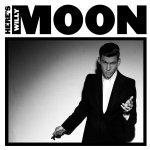
Willy Moon Here's Willy Moon
(Island)
Odds are you'll have heard Willy Moon, even if you don't think that you have. Following early endorsement by Jack White and Jools Holland (the footage of a supremely agile Moon ballsily flinging himself along the length of the Later... studio really is quite something to behold, even if it understandably divided opinions among viewers), his single Yeah Yeah was picked up by Apple for the iPod commercial that seems to be a necessary step on the way to cross-over pop success these days.
And, really who could blame any of that lot for falling for Moon's charms. Looking beyond the 23-year old New Zealander's strikingly tall and fresh faced looks, there's the appealing gimmick in that the guy fetishes two, at first seemingly incredibly diverse, musical genres - 50s rock 'n' roll and aggressive hip hop (if you ever wanted to hear what Elvis sampling The Wu-Tang Clan would've been like, then look no further than that aforementioned single) - and refuses to acknowledge pretty much everything that happened in the half century in between.
While his attempts to splice the two could be, and no doubt have been, said to be a bit cynical - if nascent rock n' roll was criticised, whether rightly or wrongly, for merely being white guys stealing black music and making it more marketable, is Moon's pilfering of hip-hop tropes doubly bad? (and, with the occasional bits of afro-beat-y guitar on She Loves Me, is he even attempting to go for the triple whammy?) - it would take a pair of ears far more immune to joy than these to not admit that it's a combination that's often spectacularly effective.
Despite working to such a deliberately limited palette, there's something still quite giddily breathtaking about many of these twelve tracks (or at least the first half of them), and it's not all down to the breakneck pace that they rush past at (the album's done and dusted in less than twenty-nine minutes, and only the opener, Get Up, makes it to the three minute mark). Moon goes for broke in pulling together as many aspects of his pet genres as he can, resulting in a lavish smothering of gospel choirs and digitally manipulated backing vocals, both in the the playful rustic dread of Railroad Track, and the (fairly masculine) skipping-rope rhymes of My Girl, and while he often deals in clichés, both lyrical and musical (the latter perhaps most obvious in the demented twelve-bar blues of What I Want), they're often delivered with wit, serving to first raise and then subvert expectations.
It also helps that it's all delivered Moon's clear, confident voice, which acts as an instant hook, even if on the other hand, it doesn't seem to offer much after that. There's very much an element of performance to his act; the knowing sneer of Working for the Company, for example, might, if you stripped out the honking synth horns, even be outright musical theatre. But then, when you're offering up attempts on such untouchable classics as I Put a Spell on You, it makes sense that the only way you'd not bottle it under the pressure would be to put up some form of ironic distance. Still, it does mean that there's nothing to really hang onto here; the parade of 'girls' 'babies' and the like that he sings about never really seem to take on much form other than mere lists of qualities, and the one attempt at darkness, the closing Murder Ballad, turns out to just be a throwaway clatteringly gloomy instrumental that doesn't really go anywhere (even if the honky-tonk piano is a very nice touch).
So, does Here's Willy Moon create the grand sense of an entrance that the man intended (particularly with that announcement of an album title)? Well, kind of; it's terrific fun while it lasts, and Moon's knowingly gawky charms just about manage to stave off any lingering Jimmy Ray (remember him?) related doubts, but the general lack of content does offer fairly compromised value for money, and raises questions as to if he'll be able to think of ways to expand his repertoire without ruining the central conceit, or just end up being an oddball one trick pony.
4 April, 2013 - 04:27 — Mark Davison